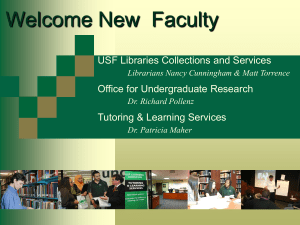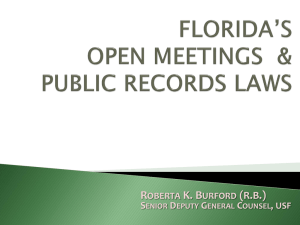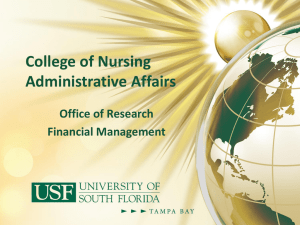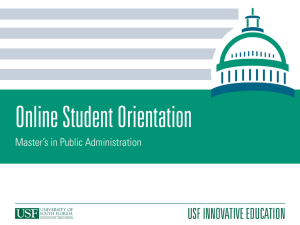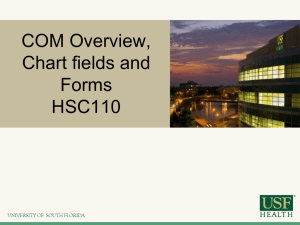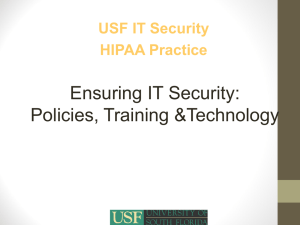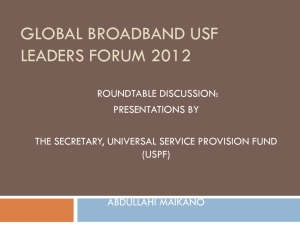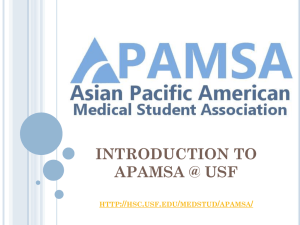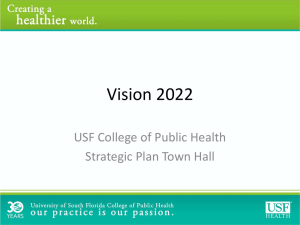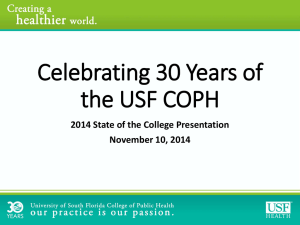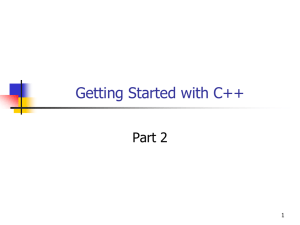Why do I need it? - University of South Florida
advertisement
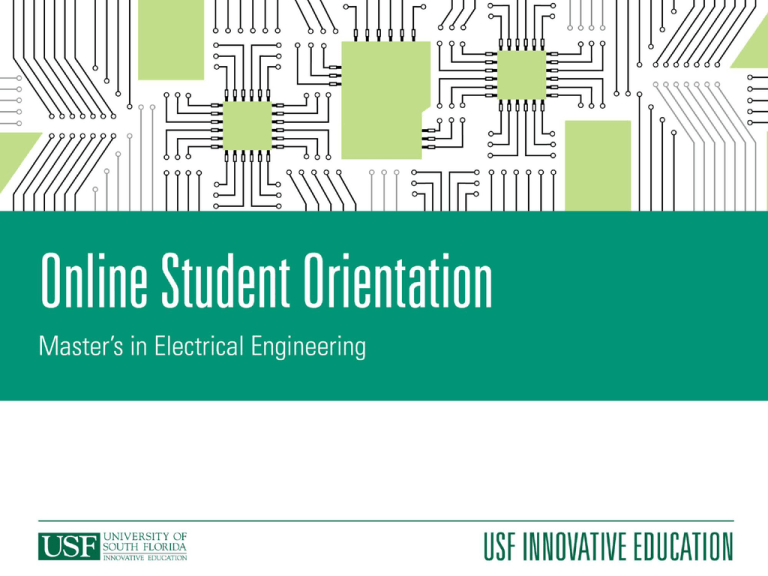
Welcome to USF! On behalf of the faculty and staff at Innovative Education, we would like to welcome you to USF! This online orientation is designed to help you make the most of your academic career here at USF. Each section provides you tools to help ensure your success as you progress toward your academic goals. Online Learning What is it? Online learning is a course delivery model that allows you to take your courses online. Taking an online course is not necessarily more difficult than taking an on-campus course. However, the skills needed to succeed are different. What skills are required to succeed in an online course? • Be independent and self-motivated • Manage your time effectively • Read and write well • Dedicate time to focus on your course work • Collaborate with your classmates on group projects • Complete your assignments without face-to-face help • Check in frequently to review announcements and participate in online discussions Online Learning What technical skills do I need? You should possess basic computer and internet skills, including: • Word processing skills (type, cut, paste, copy, save, rename, etc.) • Email skills (send email, attach files, etc.) • Internet skills (open a browser, browse websites, download content, etc.) What tools do I need? You need to have a computer and be able to access the internet. The recommended web browsers are Mozilla Firefox or Google Chrome. Your course may require other technology as well. How do I prepare for the first day of classes? You must log in to your course on the first day of classes. This is mandatory. Helpful Hint: Make sure you have a back up computer available for technical emergencies. Master’s in Electrical Engineering Welcome to the Electrical Engineering Department at the University of South Florida. Our students, at both the undergraduate and graduate level, enjoy dedicated, personal guidance from our faculty. Our student body is diverse, and our research spans from applied to theoretical studies of many fundamental areas of electrical engineering. The faculty enjoy strong partnerships throughout industry and with prominent national laboratories and federal agencies. The USF Electrical Engineering Department offers this unique MSEE-P program that has exceptional quality and is responsive to the needs of working professionals. We look forward to having you participate in our program. Message from Program Director Tom Weller: http://youtu.be/SbwIXFTyQwE Curriculum Information For more information regarding suggested class schedule and for detailed course descriptions, please click on the links below: Class Schedule Course Descriptions Faculty Information Tom Weller, Ph.D. Program Director Professor and Chair 813-974-2440 weller@usf.edu Huseyin Arslan, Ph.D. Associate Professor 813-974-3940 arslan@eng.usf.edu Larry Dunleavy, Ph.D. Professor 813-974-2574 dunleavy@eng.usf.edu Lingling Fan, Ph.D. Assistant Professor 813-974-2031 linglingfan@usf.edu Christos Ferekides, Ph.D. Professor 813-974-4818 ferekide@eng.usf.edu Willie Moreno, Ph.D. Professor 813-974-4775 moreno@usf.edu Don Morel, Ph.D. Professor 813-974-2508 morel@eng.usf.edu Ravi Sankar, Ph.D. Professor 813-974-4769 sankar@usf.edu Rudy Schlaf, Ph.D. Professor 813-974-8463 schlaf@eng.usf.edu Zhixin Miao, Ph.D. Assistant Professor 813-974-4237 zmiao@usf.edu Salvatore Morgera, Ph.D. Professor 813-974-1004 sdmorgera@.usf.edu Dave Snider, Ph.D. Emeritus Professor 813-974-4785 snider@usf.edu Andrew M. Hoff, Ph.D. Professor (813) 974-4958 hoff@eng.usf.edu Gokhan Mumcu, Ph.D. Assistant Professor 813-974-8178 mumcu@usf.edu Sylvia Thomas, Ph.D. Assistant Professor 813-974-4011 sylvia@eng.usf.edu Steve Saddow, Ph.D. Professor 813-974-4773 saddow@usf.edu Jing Wang, Ph.D. Associate Professor (813) 974-6011 jingw@eng.usf.edu Advisor Information Admission Advisor • All information about application • Information about conditional acceptance Elizabeth Blount, eblount1@mail.com.usf.edu, 813-818-9100 Student Success Advisor • Program Information • Registration for all Courses • Add/Drop • Course Withdrawals Elizabeth Blount, eblount1@mail.com.usf.edu, 813-818-9100 General Information • Leave of Absence • Voluntary withdrawal from program • Probation Status • For general questions about the program Lisa Orr, lisaorr@usf.edu, 813-974-5565 USF NetID What is it? Your USF NetID is your user ID at the university. Why do I need it? It allows you to access Canvas, the learning management system you will use to access your online courses, and OASIS, USF's course registration system, as well as many other services. How do I get it? To obtain your NetID, visit University Network Access Services, click on "Activate your USF Net ID," and provide your first and last name, your USF ID #, your birthday, and the last four digits of your SSN. Where can I go for help? For detailed instructions, or to view an online tutorial, visit USF NetID: Activating & Selecting. Email What is it? All students will automatically be assigned an official USF student email account. Your email address will start with your Net ID, and end with the following: @mail.usf.edu Why do I need it? Your USF student email account will be used for all course correspondence and for all official university announcements, so please check it regularly. You can set your USF email address to forward to your personal email account. How can I access it? Visit the MyUSF portal, and login using your NetID. Once you are logged in, you can access your USF student email account. Helpful Hint: Check your USF email account often, and always use it when you communication with USF. Registration When do I register for courses? After you receive your acceptance letter, your advisor will call you to go over program details and course information. At that time, you will let your advisor know which courses you want to register for that term. How do I register for courses? Your advisor will handle your course registration for you. You will NOT register through OASIS, USF’s student information system. Do I get a registration confirmation? Once you are registered for your courses, you will receive an email confirmation. Helpful hint: Taking courses outside of your program plan will not increase your financial aid reward. In order to graduate in a timely manner, we recommend that you only take the courses listed in your program plan. OASIS What is it? OASIS is USF’s Online Access Student Information System. OASIS provides USF applicants and new, current and former students online access to their student records. Why do I need it? You will use OASIS to access all of your student records, including your admission application, your financial aid information, your contact information, your immunization records, your registration records, your current schedule, your tuition and fees and more. How do I access it? Visit the OASIS login page, and login using your NetID. Once you are logged in, you can access all your student records. Helpful Hint: If you move, or change your name or telephone number, don’t forget to update your contact information in OASIS. Financial Aid What is it? Financial aid is available to assist students in covering the costs of education. It is available in several different forms, including loans, which must be repaid with interest, usually beginning 6-9 months after graduation, and scholarships and grants, which are awarded to student and are considered gifts which do not need to be repaid, but must be noted on your income tax returns. How do I apply for financial aid? The first step is to complete the Free Application for Federal Student aid, commonly known as the FAFSA. Where can I get help? For complete information about this process, and more details about the forms of aid available, visit the USF Office of Financial Aid and Scholarships website. Canvas What is it? Canvas is USF’s learning management system, also known as the LMS. Why do I need it? You will use Canvas to access all of your online course content, including your assignments, exams, etc. How can I access it? Visit the MyUSF portal (my.usf.edu), and login using your NetID. Once you are logged in, you can access Canvas. Please note: The recommended web browsers for Canvas are Mozilla Firefox or Google Chrome. Where can I go for help? For complete instructions on how to use Canvas, view the Canvas Student Orientation. In addition, Canvas contains a variety of tutorials and resources, as well as direct access to the USF IT Help Desk. Technical Support What is it? USF Information Technology (IT) is here to assist you when you experience technical difficulties while taking your online course. Why do I need it? IT can answer questions about your NetID, your email account, your applications, and other technology resources. Please note that your instructor is there to answer your course-related questions, but cannot assist you with technology issues. Where can I go for help? If you need help, email the IT Help Desk a description of your problem. To facilitate your request, include the following details in your email: • Net ID • Operating system and version • Browser and version • Computer make and model Other Resources What are they? The university has developed a variety of resources to help you: • Access student records and register for classes • View the academic calendar • Learn about financial aid • Learn about your military benefits • Search course schedules • Prepare for standardized tests • Obtain career counseling • Find support for students with disabilities • Find a tutor • Access library resources • Utilize technology resources • And more! How can I access them? Visit the USF website for more information. Policies & Procedures What are they? USF has developed policies that cover a wide variety of topics, including everything from academic integrity to enrollment requirements and much more. Why do I need to be familiar with USF's policies? It is your responsibility to know ALL the policies, procedures and requirements that apply to your program. Familiarizing yourself with this information now will save you from surprises later. What are some of the most critical policies? Graduate Catalog • When you enter USF, the catalog for that specific year serves as your contract with USF. • All USF policies, procedures and requirements are found in this catalog. • It is your responsibility to review your catalog and understand information that pertains to you and your degree. Mandatory First Day of Attendance • You must log in to Canvas on the first day of each course in order to avoid being dropped from all your courses. Policies & Procedures Probation • Any student who is not in good academic standing (grade of B or better) at the end of a semester will be on probation the following semester. • The college or program may place students on probation for other reasons. • Notification of probation will be made in writing by the department to the student and the college dean. • At the end of each probationary semester, the department will recommend one of the following in writing to the college dean: removal of probation; continued probation; or dismissal from the degree program. Drop vs. Withdrawal • During the first week of classes, students may drop or add classes with no academic or financial liability, provided the correct process is followed before the deadline. • After the end of the first week of classes, students may withdraw from a class, but will be liable for the tuition and fees, and will receive a “W” on their transcripts. Policies & Procedures Academic Standards and Grades • To be considered a student in good standing, graduate students must maintain an overall minimum GPA of 3.00 in all courses taken as a graduate student, and maintain an overall minimum GPA of 3.00 in all courses taken in each of the student’s degree-seeking programs. • No grades of C or below will be accepted toward a graduate degree. • Students must meet the requirements to be in good standing to graduate. How can I learn more? Visit Graduate School Policies and Procedures to learn more. Helpful Hint: If you have questions about USF's policies and procedures, always ask your advisor. Academic Integrity What is it? Academic integrity is grounded in certain fundamental values, which include honesty, respect and fairness. Broadly defined, it is the completion of all academic endeavors and claims of scholarly knowledge as representative of one’s own efforts. Issues related to academic integrity include plagiarism, cheating on examinations, reusing papers and submitting your own work. Why do I need to know about it? All USF students are expected to demonstrate the highest level of honesty and responsibility. Any form of dishonesty destroys the trust between faculty and student, is unfair to other students within the program and contradicts the reason for entering the program. Ignorance of the rules is not an excuse. What is required of me? All USF students are required to view this tutorial before the first day of classes. How can I learn more? View USF's policy on the Academic Integrity of Students for more information. Orientation Verification In order to certify that you have completed this orientation, please download this form, complete it and email it to Lisa Orr: lisaorr@usf.edu
